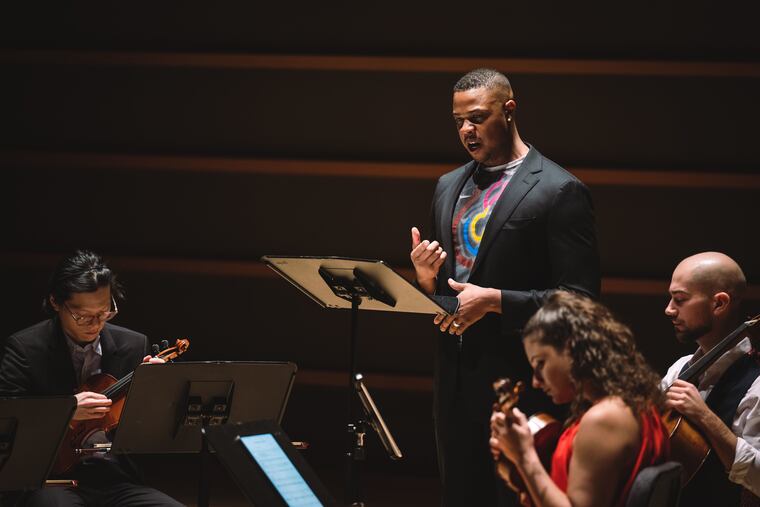The brilliance of Davóne Tines arrives in a flurry of Philadelphia appearances
The bass-baritone is quickly becoming an important artistic voice in Philadelphia.

It takes some artistic brilliance to outshine Beethoven and Brahms, but the sensation was unavoidable in two concerts Friday. Davóne Tines was at the center of both experiences.
The polished, trenchant bass-baritone swept into town in a string of performances that began with a Philadelphia Orchestra Friday matinee in Verizon Hall and continued that evening in a more intimate encounter across the plaza in the Perelman Theater.
It was partly about relevance, this relative dimming of Beethoven and Brahms. With the orchestra, Tines performed “Sermon,” a triptych of pieces, each preceded by poetry, meant to be “socially relevant calls to action in the face of horrific violence against marginalized peoples,” as the program note states. There’s so much urgency in the music, and in the world right now, that the two other works on the program, Beethoven’s Symphonies No. 2 and 8, sounded strangely distant, like museum pieces.
In the Perelman, Tines was with the Dover Quartet, and here, too, the music of now towered over the past. Brahms’ String Quartet in A Minor is gracious from start to finish. But coming after Caroline Shaw’s By and By for voice and string quartet, it emerged somehow of shrunken stature.
It’s not a contest, of course, and Brahms and Beethoven, in total, retain their ability to be giants. That will never change. Just not in these particular pieces, not in these times, and not next to the works Tines brought with him.
How much of the blunting of standard-repertoire works had to do with the performances? The Dover string quartet played well, though not with an especially strong point of view. As for the orchestra, music director Yannick Nézet-Séguin was on the podium, showing once again aspects of why many enjoy his presence. He’s fun to watch (as one listener afterward reminded me). Musically, though, it would be hard to say these were high-impact or revelatory performances of Beethoven symphonies.
Wouldn’t the deeper probing of Mozart’s Symphony No. 40 in G Minor — which was originally programmed — have been a more fitting answer to “Sermon”?
Tines’s first outing here with the short song cycle was last season on the orchestra’s Digital Stage series. This time, live in the concert hall, it was somewhat changed. The third piece in the set, a potent excerpt from the Anthony Davis/Thulani Davis opera X: The Life and Times of Malcolm X, was preceded by Tines reading not only a Maya Angelou text, but also a new one: “EXEGESIS” by jessica Care moore, and it’s a stunning addition.
At one point, the poet has the performer in essence breaking the fourth wall, calling out the audience.
“This is not a show. This is our lives. This is my life. Performance art around our trauma doesn’t move me in the same way. It’s not even for me, for that matter. It’s really about explaining why to white people, why they should care about us as equal human beings. And I find it to be quite absurd.”
The two other sections of the triptych — music by John Adams from El Niño and Vigil by Tines and Igee Dieudonné arranged by Matthew Aucoin — work beautifully, set up by texts by James Baldwin and Langston Hughes. But the directness of moore’s poem with Davis’s music, especially realized by an ensemble of this force and precision, resonates most powerfully.
With a deft economy, the poetry states its case. Then the music, with its vivid bursts of anxiety, makes you feel it. Together they add up to something more.
Tines’s double booking of concerts on Friday wasn’t a matter of mere efficiency. The struggle depicted in the repertoire in one hall was answered with resolution in the other. Tines’s Perelman appearance, hosted by the Philadelphia Chamber Music Society, featured Shaw’s bluegrass-tinged By and By, a setting of the hymns “Will There Be Any Stars in My Crown” and “I’ll Fly Away.” The Dover supplied a number of special string effects, the most breathtaking of which was violin writing at the end that floats off in an act of pure spirit.
In these pieces as well as in a stirring performance of Barber’s Dover Beach, Tines showed incredible range. His basic sound appears instantaneously and rich from top to bottom. But within that sound blooms an array of inflections and timbres — a classic molten bass, a more informal vernacular voice, and many moments of nuance lighting the text with meaning.
Tines, based in North Carolina, is already signed for a full PCMS recital next season in a program structured around a mass with individual movements by various composers, including Shaw, Julius Eastman, and Bach. He’s called this a queering of the mass — “Queering in the broad sense of bending it to my own understanding.”
It sounds like a welcome perspective and one that promises to make Tines one of the most important new artistic influences on the city.